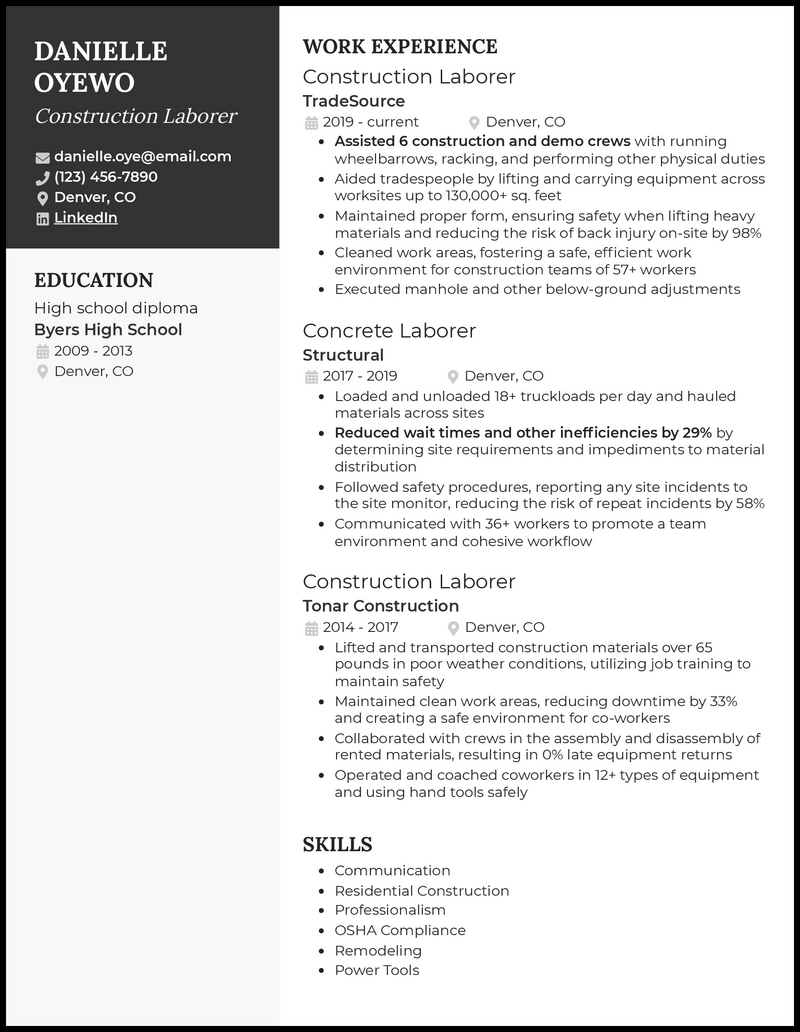As a construction laborer, you play a vital role in supporting the construction process and ensuring efficient progress. By handling materials, operating equipment, and supporting other workers, you keep the site clean, safe, and permanently primed for the next task.
It’s a job that’s essential for the safe completion of projects but it’s not easy to translate into a resume. Not without a little help, anyway.
Our construction laborer resume templates and online cover letter generator are specially designed for your particular need and have helped others just like you land new jobs with ease. Just follow our resume tips and watch as your perfect resume template almost writes itself.
Why this resume works
- You’re a great worker. Strong. Team-spirited. Attentive to detail. And even tech-savvy. But no one’s looking for you! Take our advice and bold (italicize or underline) some of your professional achievements on your construction laborer resume to grab the recruiter’s attention and help them see your value.
- “Assisted 6 construction and demo crews” and “reduced wait times and other inefficiencies by 29%” make for mention-worthy examples. By showcasing Danielle’s potential impact, the phrases prompt recruiters to sync up with her and learn more about what she can bring to the table.
Related resume examples
What Matters Most: Your Construction Skills & Physical Labor Experience

The skills section is a majorly important part of your resume and something that ATS (applicant tracking systems) focus on. This means you need to fill it with highly relevant keywords specific to the role you’re applying for.
The best way to do this is to read through the job description and pick out the skills that are mentioned, such as concrete work, Microsoft Excel proficiency, and OSHA compliance. Keep things highly specific to your job; you can skip generic terms like “hard worker.”
It’s essential that you include these skills in your list not only to satisfy the automated resume screeners but to show human recruiters that you’re ready to start right away.
9 best construction laborer skills
- OSHA Compliance
- Structural Steelwork
- Power Tool Expertise
- Concrete Work
- AutoCAD
- Microsoft Excel
- Demolition Techniques
- Site Preparation
- Maintaining Equipment
Sample construction laborer work experience bullet points
When it comes to your work bullet points, the trick is to focus on the things you’re proud of instead of your day-to-day tasks. This shows the hiring managers the impact you made through your work, rather than simply communicating your responsibilities.
Once you’ve covered the essential areas like equipment operation and safety compliance, you can add points that you personally care about, such as delivering a construction project well ahead of schedule.
To make these points stand out as much as possible, add metrics that specify the exact impact you’ve had.
Here’s how you can do it in your resume:
- Safely operated and maintained equipment such as excavators and forklifts, contributing to the completion of 25+ projects
- Assisted in implementing new safety protocols that resulted in a 40% reduction in on-site accidents over a six-month period
- Developed a set of improved site organization and cleanup procedures, resulting in a 20% reduction in time spent on site cleanup tasks
- Aided tradespeople by lifting and carrying equipment across worksites up to 130,000+ sq. feet
Top 5 Tips for Your Construction Laborer Resume
- Show off your certifications
- Construction and safety certifications such as the LSP (Licensed Safety Professional) validate your expertise, show your commitment to continuous learning, as well as showcase an expanded skill set. Add them to their own section in your resume.
- Showcase communication skills
- Working seamlessly as a team is essential to success and safety on a construction site, so it’s a good idea to emphasize your teamwork skills. Try to think of instances when you worked with various construction and demo crews and what you achieved through that cooperation.
- Highlight physical stamina
- It’s important to show that not only do you know the job, but that you can keep up with it too. You can do this by including information about hours you’ve worked in the past while doing high-intensity tasks, the weight of materials you had to carry, and the size of your construction sites.
- Match the job
- Different projects take place in different environments, use various equipment, and require different skills. Make sure to read exactly what each specific job description calls for and use that information to tweak your resume.
- Polish your resume
- Writing isn’t very relevant to the job of a construction worker, but a diligent attitude and attention to detail are. This means letting sloppy mistakes slip into your resume can still reflect badly on you, so it’s important to run it through a resume checker and ensure it’s error-free.
To make your resume stand out, simply follow these three tips: tailor your resume to each application; include achievements, metrics, and figures in your work experience; and lastly, ensure the entire resume is error-free.
You don’t need references from previous construction jobs at this point. However, you can add a “references on request” note at the bottom of the page to show that you’re ready to share them.
It depends on how much experience you have. If you’re still new to the job, focus on your professional experience and supplement it with relevant training in the construction industry. If you’ve worked on a lot of projects, you can include the total number in your career summary and include the most recent three in your work experience.










